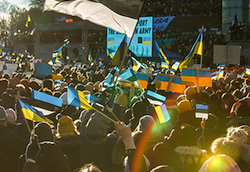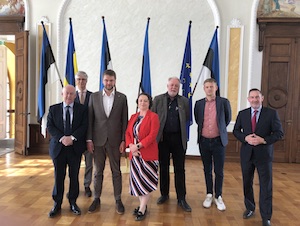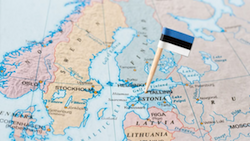Russian aggression is a threat to democrats and progressives everywhere, argues GARY KENT. Just ask the Estonians.
A major focus of my international relations degree in the 1970s was Soviet aggression and subversion, a timely topic I thought until the bottom dropped out of the market when the Berlin Wall fell and the Soviet bloc imploded.
 A vicious and reactionary variant of that aggression is now causing immense death, grief and destruction in Ukraine. It threatens the economic, political and military security of Europe, including the UK. Without a collapse of the Russian army or clear internal democratic régime change, it could rock Europe for many years.
A vicious and reactionary variant of that aggression is now causing immense death, grief and destruction in Ukraine. It threatens the economic, political and military security of Europe, including the UK. Without a collapse of the Russian army or clear internal democratic régime change, it could rock Europe for many years.
How did we get here? After the chaotic collapse of the USSR in 1991, we entered a period of false hopes about a peace dividend. But ancestral hatreds in some repressed communist societies erupted into civil wars in the 1990s. Western interventions helped end them, although not entirely, as we see in the western Balkans today where dangerous tensions remain.
The peoples of some former Soviet bloc members decided freely to join the European Union and/or Nato to escape the suffocating Russian embrace. Russia accepted this, albeit reluctantly, as it was also consumed by turbo-capitalism, super-charged by predatory gangsters and oligarchs who pauperised many Russian people and slashed life expectancy. In any case, Russia had and has no right to dictate the freewill of its neighbours.
The current crisis was decades in the making. Putin assumed power in 1999 and, after initial warm words about democracy and co-operation, started to remake Russia in line with his KGB instincts. Acting the strongman, he has steadily liquidated democracy and basic freedoms.
He said the dissolution of the USSR “was the greatest geopolitical catastrophe of the century” and that it encouraged separatism. The Russian Federation, to use its full name, contains formally sovereign states that have power-sharing agreements with Moscow, ones the Kremlin currently ignores. In theory, the federation could split 34 ways.
But those states witnessed the consequences of defying Moscow in 2000 when Putin razed Grozny, the capital of separatist Chechnya, causing between 25,000 and 200,000 deaths, and organised lethal false flag operations to justify militarisation.
External aggression
The Russification of the federation morphed into external aggression with the attack on Georgia in 2008 and then Ukraine in 2014. Muted international responses encouraged Putin as Western countries hoped for a sustainable bargain with Russia – to import its energy and create interdependence, and so encourage peaceful co-operation and democracy.
 Many Western nations became dangerously dependent on Russia whose use of the energy weapon last year was a painful wake-up call. It’s now an empty threat as countries such as Germany have found alternatives.
Many Western nations became dangerously dependent on Russia whose use of the energy weapon last year was a painful wake-up call. It’s now an empty threat as countries such as Germany have found alternatives.
Germany also responded to the Russian attack on Ukraine with its Zeitenwende – turning point – to boost its resilience and defences, and that of Nato. This has been painful for a country with its own history of tank battles in Ukraine during the Second World War.
The learning curve was steep. Like many in early 2022, I doubted the gathering forces on Ukraine’s borders would be used. The Estonian intelligence service beat the CIA and MI6 in predicting the Russian attack.
Nestled next to Russia on the strategic Baltic Sea, Estonians have much direct knowledge of the current dominant Russian mindset on democracy at home and the area beyond its borders, which it still sees as its rightful orbit.
Estonia escaped from the Russian empire in 1918. The Soviets took Estonia in 1940 under the Nazi/Soviet Pact. The Nazis seized it for three years from 1941. Then USSR reoccupied it from 1944 to 1991. The suffering of Estonians is movingly recorded in the Vabamu Museum of Occupations and Freedom in Tallinn.
Many thousands, including Estonian prime minister Kaja Kallas’s grandmother, were deported to Siberia, and many thousands of Soviet citizens were settled in Estonia, changing its demographic balance. About a third of its people are now Russian speaking.
Countries such as Estonia on the eastern flank of Nato have much historical skin in the game and have long warned of Russian revanchism. After meeting senior Estonian MPs and others on a recent Labour International Group delegation (see photo above) I can boil their views down to what I call ‘the Tallinn thesis’.
Russia rejects democracy at home and abroad. It doesn’t respect the rights of its neighbours to make their own destiny. It cannot be trusted to abide by any agreements. Estonia once paid the Danegeld – bribes to the Vikings to be left in peace – but the Vikings kept returning for more. Appeasement doesn’t work.
Russian threats must be deterred. We should not be intimidated by its nuclear sabre-rattling. If they win in Ukraine, they will keep going when they recover their strength. Ukraine should join Nato as soon as practicable. This is a long-haul struggle for freedom.
Belligerent dictatorship
I visited Estonia for a European Nuclear Disarmament (END) conference in 1990, about a year before independence. Tallinn was lively, although I recall difficulty finding anywhere to eat. Today’s Tallinn is full of bars, restaurants, young techies on laptops, and stag and hen parties from many parts of Europe.
 The food was rancid and the atmosphere was tense on the final END event in Moscow in 1991. We left five minutes after the coup against Gorbachev, which had been prompted partly by hard-liners’ fears of “losing” the Baltic States.
The food was rancid and the atmosphere was tense on the final END event in Moscow in 1991. We left five minutes after the coup against Gorbachev, which had been prompted partly by hard-liners’ fears of “losing” the Baltic States.
Since independence, Estonia has been modernising its Sovietesque economy. It’s about the same size as Denmark or Holland but sparsely populated outside the capital and half covered by forest. Public services are difficult to deliver.
They have pioneered e-Estonia, a digital ID card and portal for public services. This saves three million working hours a year and 2% of their national budget – the same as their defence budget, one third of which is spent on supplying Ukraine. Tallinn’s skyline and buildings sport Ukrainian flags.
Small businesses can be set up in three hours and the economy is now almost entirely comprised of small and medium sized enterprises, plus 10 tech unicorns (companies valued at $1 billion without being stock market listed). These include Bolt, which delivers a range of consumer and transport services.
Together with unions, the centrist government, including Social Democrats, is seeking to increase wages and productivity. Its education and childcare services are internationally esteemed. Labour is examining these domestic achievements.
But Estonia lives next door to a belligerent dictatorship. Its politicians’ candid and forensic analysis of Russia, European security, and the vital defensive role of Nato, should be listened to with respect.
If Russia continues with its rampant Putinism, perhaps even without him, darker days lie ahead. The UK and our social democratic aspirations will also be in the firing line.
—-
Gary Kent has been a Labour Party member since 1976 and has worked in Parliament since 1987. He now focusses on Iraqi Kurdistan and Labour foreign policy. He writes a monthly column for Progressive Britain.
He visited Estonia in May 2023 as part of a Labour International Group delegation along with Labour MPs Wayne David and Catherine McKinnell, and fellow writer and activist Paul Mason (featured far left, centre and far right respectively on the photo above, along with Gary, third from right, and members of Estonia’s Social Democratic Party, Sotsiaaldemokraatlik Erakond).
They were joined by a representative from the Friedrich Ebert Foundation (FES). They met Social Democrats, the TUC, the GB friendship group and the National Defence Committee in the Estonian Parliament, plus a respected security think tank. They were also briefed by the Nato Centre of Excellence on Cyber Defence, the ‘e-Estonia’ programme, and the British Ambassador. The FES paid for Gary’s travel and hotel costs.



13 June 2023
There is much in Gary Kent’s article that is indisputable insofar as Putin is an aggressive megalomaniac and war monger, and Russia is guilty of invading a neighbouring country and some terrible war crimes.
That said, it is simplistic to suggest the war is a black and white fight between good and evil without mentioning NATO’s role. There is a growing body of opinion within Europe and beyond that is critical of the USA for poking the bear and stirring-up the conflict on Russia’s borders. While Ukrainian and Russian soldiers are dying and suffering, the victims of this terrible war must also include impoverished millions of working people across the world who are paying the price via commodity and food price inflation, homelessness and hunger. Billions of taxpayers’ money is spent, not on beneficial social projects and helping vulnerable and needy citizens, but to finance NATO’s proxy war.
It is clear the USA, Britain and much of Europe want victory over Russia on the battlefield and have little interest in peace talks or any sort of compromise. While I don’t have any answers to how the Ukraine/Russian conflict might be resolved, I do hope it’s through negotiations and compromise, perhaps based on Ukraine’s neutrality and an end to NATO expansion.